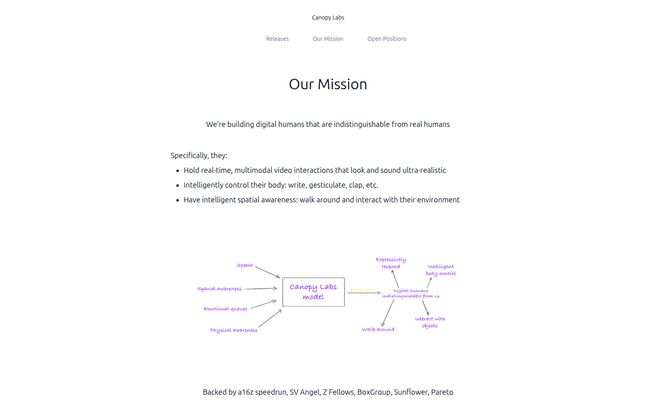Handing your kid a smartphone or a tablet feels a bit like handing them the keys to a Lamborghini and a map of the entire world. It's an incredible tool for connection and learning, but... it's also a direct portal to some of the internet’s less-than-savory corners. I’ve spent years in the SEO and digital trends space, and trust me, I’ve seen the underbelly of the web. It's a place you don't want your kids stumbling into accidentally.
For a while, my approach was a patchwork of built-in phone settings, constant “what are you looking at?” check-ins, and a whole lot of crossed fingers. It was exhausting. And frankly, not very effective. Then I started hearing whispers in parent groups and tech forums about a different kind of solution, one that used AI to be a bit smarter than a simple blocklist. It’s called Canopy, and I have to say, my curiosity was piqued.

Visit Canopy
So, What Exactly Is This Canopy Thing?
Think of Canopy as a digital co-pilot for your parenting journey. It isn't just another blunt-force website blocker. Instead, it’s a sophisticated app that you install on your child's devices (and your own) that uses artificial intelligence to create a safer digital environment. Its main mission is threefold: protect kids from explicit content, help them build healthier screen time habits, and give parents like us a little bit of our sanity back. It’s not about spying; it’s about creating guardrails for the digital superhighway.
Breaking Down The Features That Actually Matter
Okay, buzzwords are great, but what does this app actually do? I’ve been playing around with it for a while now, and some features genuinely stand out from the crowd of other parental control apps I’ve tested.
The AI-Powered Content Filter is Shockingly Smart
This is Canopy's crown jewel. Most filters just block URLs. Naughtywebsite.com? Blocked. But what about images that pop up in a search? Or a seemingly innocent site that has some questionable ads in the sidebar? Canopy’s AI works in real-time to analyze the content of a page as it loads. If it detects nudity or other explicit content in an image or video, it smartly blocks just that piece of content without necessarily blocking the entire page. It’s less like a giant brick wall and more like a precise, surgical tool. It's pretty impressive stuff.
It Tackles the Tough Stuff: Sexting Prevention
This is a topic that makes most parents squirm, but we can't ignore it. Canopy has a feature designed to prevent sexting by monitoring the camera roll. If it detects an explicit photo has been taken or saved, it blurs the image and alerts you, the parent. This opens a door for a conversation, not just a punishment. It’s a proactive measure that could prevent a mistake with lifelong consequences, and in my book, that's a huge win.
More Than Just Blocking: Managing Screen Time
I’m a big believer in teaching balance, not just imposing bans. Canopy lets you schedule “internet downtime.” For our family, this means no Wi-Fi on the kids’ devices after 8 PM on school nights. It’s not a fight anymore; it’s just the rule, enforced by the app. You can also block specific apps or websites that are becoming a time-sink (looking at you, endless YouTube Shorts). It helps turn screen time from a constant negotiation into a structured part of their day.
The Little Things That Make a Big Difference
Beyond the big-ticket items, there are a few other clever features. There's Removal Prevention, which stops a tech-savvy kid from just deleting the app to get around the rules. You get an alert if they even try. The Location Alerts are also a nice touch, giving you peace of mind by letting you know when your child arrives at or leaves a specific place, like school or a friend’s house. It's all managed from a single, easy-to-use app on your own phone.
Let's Talk Money: A Look at Canopy's Pricing
Alright, this is where the rubber meets the road. Canopy is a subscription service, and there’s no getting around that. But when you compare it to the cost of, say, a few streaming services, the price for peace of mind seems pretty reasonable. They have a few different tiers, which I’ve broken down here.
| Plan | Devices | Monthly Price (Billed Annually) | Monthly Price (Billed Monthly) |
|---|---|---|---|
| Individual | Up to 3 | $7.99/mo | $9.99/mo |
| Duo | Up to 5 | $8.99/mo | $11.99/mo |
| Family | Up to 10 | $9.99/mo | $15.99/mo |
Prices are based on information from their site and could change.
Honestly, paying annually saves you a decent chunk of change. For most families, the Family plan billed annually is the best bang for your buck, covering phones, tablets, and maybe even a family computer.
The Not-So-Perfect Side of Things
No tool is perfect, and it’d be dishonest to pretend Canopy is. The effectiveness is heavily reliant on its AI, and AI can make mistakes. I've heard of it occasionally flagging a perfectly innocent image (like a picture from a biology textbook) or, more rarely, missing something subtle. It's a machine, not a human moderator sitting next to your kid. Also, the subscription cancellation process is handled through the app store (Apple or Google), which can be a minor hoop to jump through if you're not used to it. These aren't deal-breakers for me, but they're worth knowing.
Frequently Asked Questions About Canopy
- How does Canopy's AI filter content?
- It doesn't just use a list of bad websites. It analyzes images and text on a page in real time. If it sees something that its programming identifies as sexually explicit, it blocks that specific content from appearing on the screen, often without disrupting the rest of the page.
- Can my kid just delete the Canopy app?
- Nope! That's the beauty of the Removal Prevention feature. If an attempt is made to uninstall the app from their device, you immediately receive a notification. It's built to be tamper-proof.
- Does Canopy work on all devices?
- It covers the big ones: iOS, Android, Windows, and macOS. So whether your kid has an iPhone, an Android tablet, or a Windows laptop, you can get them covered under one account.
- Is Canopy worth the monthly cost?
- This is subjective, but in my professional and personal opinion, yes. If you're looking for a proactive, intelligent system that goes beyond basic filters, the monthly fee is a small price for the added layer of protection and the conversations it can help start.
- How is Canopy different from my phone's built-in parental controls?
- Built-in controls are a good first step, but they are often very basic. They typically rely on simple app blocking and website blacklists. Canopy’s AI is much more dynamic, able to catch things on-the-fly that a simple blocklist would miss, like content within an otherwise “allowed” app or website.
So, is Canopy the Right Choice for Your Family?
Look, every family is different. But if you’re feeling overwhelmed by the digital world your kids are growing up in, Canopy is a genuinely powerful ally. It's one of teh best-designed digital parenting apps I’ve come across. It’s not about building a cage, but about providing a safety net. It gives kids the freedom to explore while giving parents the confidence that they're protected from the worst of what's out there. It’s a smart tool for a complicated problem, and for my family, it’s brought a welcome dose of peace.



